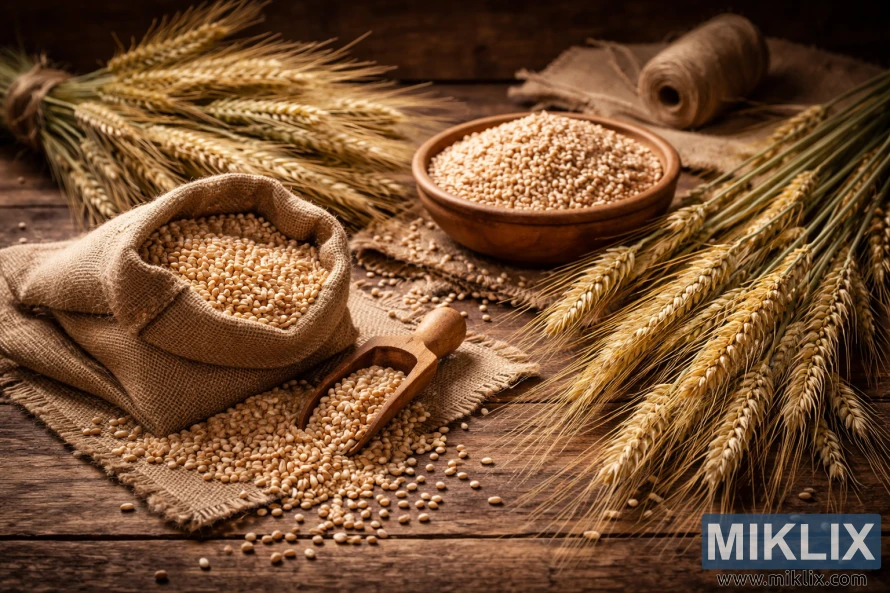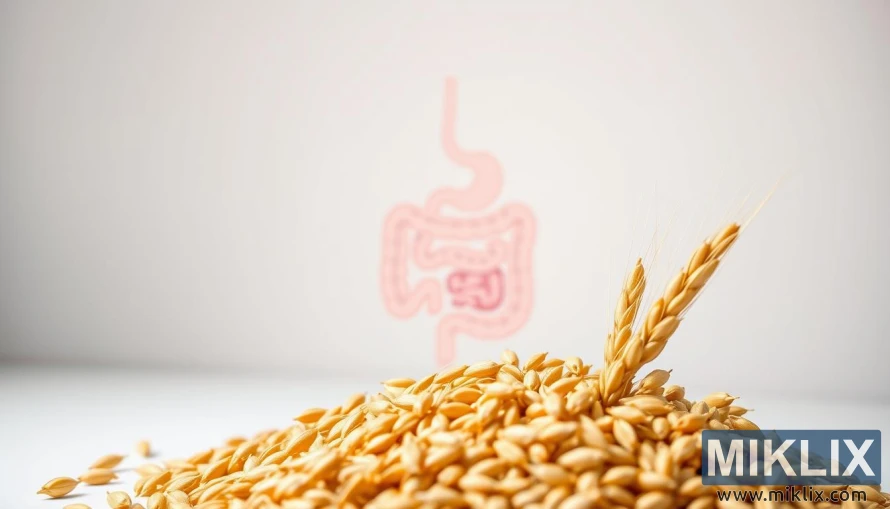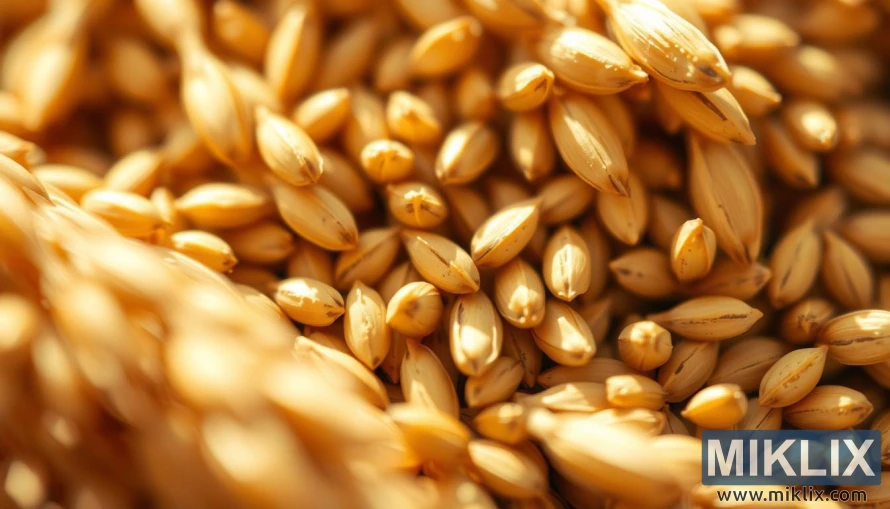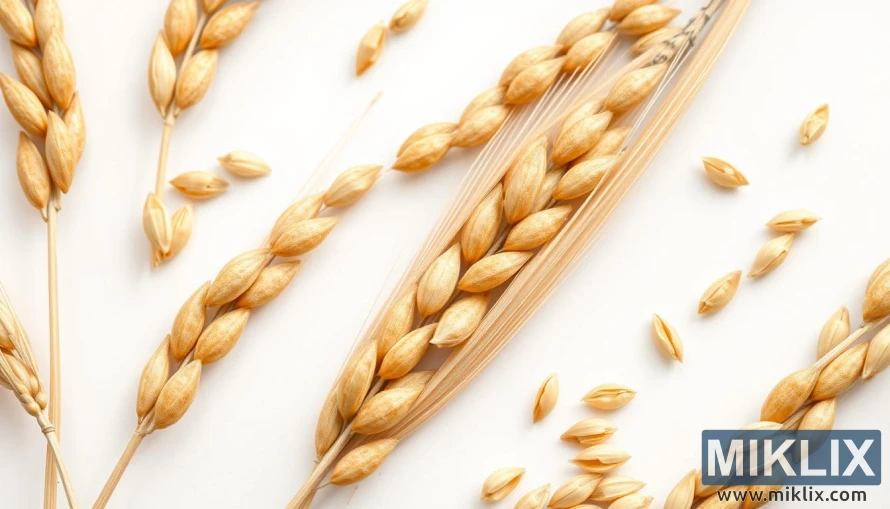Barley Benefits: From Gut Health to Glowing Skin
Published: May 15, 2025 at 11:41:24 AM UTC
Last updated: December 26, 2025 at 10:44:42 AM UTC
Barley is gaining popularity for its health perks, making it a great addition to your meals. It's full of fiber, vitamins, and minerals. These nutrients boost your health in many ways. Eating barley can help with digestion and weight control. It also lowers the risk of chronic diseases. The antioxidants in barley fight oxidative stress, making it a key part of a healthy diet.

Key Takeaways
- Barley is a whole grain rich in fiber and nutrients.
- It may improve digestive health and aid in weight management.
- Barley contains antioxidants that help prevent chronic diseases.
- Incorporating barley into your diet can lower health risks.
- It's an easy and versatile addition to various meals.
Introduction to Barley
Barley is one of the oldest grains, dating back over 10,000 years. It's a key part of agriculture history, known for its toughness and versatility. Today, many ask, what is barley? It's a nutritious grain with a nutty taste and chewy texture.
Barley comes in hulled and pearled forms. Hulled barley keeps its bran and germ, making it more nutritious. It has more fiber, vitamins, and minerals than pearled barley, which loses much of its nutrition during processing. It's great in baked goods, soups, and stews.
In American cuisine, barley is a staple in many dishes. Its long history shows its importance as a food and a nutritious choice for a healthy diet.
Rich in Many Beneficial Nutrients
Barley is packed with important nutrients. It has minerals like molybdenum, manganese, and selenium. It also has copper and phosphorus in good amounts.
Barley is also a good source of vitamin B1. Whole grain barley has lignans, which are antioxidants. They may help prevent cancer and heart disease.
Soaking or sprouting barley can make its nutrients easier to absorb. This increases the antioxidants in your body. Adding barley to your meals is a simple way to get more essential nutrients.
Barley Promotes Better Digestion
Barley is packed with fiber, which is key for better digestion. It has both soluble and insoluble fiber. The insoluble fiber makes stool bulkier, helping with regular bowel movements and avoiding constipation.
Soluble fiber feeds good gut bacteria, keeping the microbiome healthy. Studies show eating more barley can make bowel movements more regular.
Adding barley to your meals is a great way to boost your digestive health. It's easy and can make a big difference in how your gut feels.

May Aid in Weight Loss
Barley can help with weight loss thanks to its high soluble fiber, like beta-glucan. This fiber helps you feel full and less hungry. It makes it easier to control how much you eat.
Many studies have found that eating barley can lower calorie intake. It also helps control hunger. Compared to white grains, barley keeps you feeling full for longer.
Adding barley to your meals can aid in managing weight and fiber intake. It's not just good for losing weight. It also boosts your overall health.
Barley Lowers Cholesterol Levels
Barley is packed with beta-glucan, a type of soluble fiber. This fiber is great at reducing cholesterol. It works by binding bile acids in your gut and helping them leave your body.
This process lowers "bad" LDL cholesterol levels. This is good for your heart health.
Studies show that eating barley daily can lower LDL cholesterol. This helps improve your cholesterol profile. It also reduces the risk of heart disease.
Adding barley to your meals is a simple way to boost your heart health. It's a nutritious choice for a healthier diet.
Might Reduce Heart Disease Risk
Eating barley regularly can help prevent heart disease. It's full of soluble fiber, which is great for lowering bad cholesterol. Studies show that adding barley to your diet can boost your heart health.
Barley also might help lower blood pressure. Eating foods like barley can lead to slightly lower blood pressure. This makes barley a good choice for better heart health.
Prevention of Type 2 Diabetes
Barley is a powerful tool in preventing type 2 diabetes. It's full of soluble fiber and magnesium, which help control blood sugar. The soluble fiber in barley slows down how sugar is absorbed in the gut. This action greatly reduces the spike in blood sugar after eating.
Studies show that eating barley can improve glucose and insulin levels. This is great news for those at risk of type 2 diabetes. Barley helps keep blood sugar stable, which is key for managing insulin and preventing diabetes.
Adding barley to your meals is simple and tasty. You can put it in salads, soups, or as a side dish. It brings flavor and health benefits. Including barley in your diet could be a delicious way to fight off type 2 diabetes.
Potential Cancer-Fighting Properties
Diets full of whole grains like barley might help lower cancer rates, like colorectal cancer. Barley's fiber helps move food through your gut faster. This helps get rid of harmful substances that could cause cancer.
Barley also has antioxidants, like phenolic acids, which protect against cancer. These compounds fight oxidative stress and inflammation. Eating barley can help you fight cancer and get more nutrients.
Barley as a Source of Antioxidants
Barley is a remarkable grain, rich in antioxidants that play a vital role in promoting health. It helps fight oxidative stress caused by free radicals. This is important because oxidative damage is linked to many health problems.
Barley contains compounds like selenium and lignans, known for their protective effects. These antioxidants not only reduce inflammation but may also lower the risk of certain cancers. By adding barley to meals regularly, people can enjoy significant health benefits.

Prevention of Gallstones
Barley is key in preventing gallstones because it's full of fiber. Research shows that eating more fiber, like from barley, can lower gallstone risk. For every 5 grams of fiber added daily, gallstone risk drops by 10%.
This fiber boost helps the gallbladder work better. It stops bile from turning into stones. Without enough fiber, the gallbladder might struggle, leading to surgery.
Eating barley is a tasty way to get more fiber and protect against gallstones. It's good for your overall health and keeps your gallbladder healthy. This might even mean you won't need surgery later on.
Effects of Barley on Inflammation
Barley has strong anti-inflammatory properties. It can help those with chronic inflammation. Eating it regularly may protect against long-term inflammatory diseases.
The antioxidants in barley are effective against inflammation. This is true for heart disease and cancer.
Adding barley to your diet boosts its health benefits. It can lower health risks from long-term inflammation. Its special mix makes it great for meals, improving taste and health.
Versatile and Easy to Incorporate into Your Diet
Barley is very versatile, making it easy to add to many meals. It's a great choice for those looking for a healthy alternative to rice or pasta. It not only boosts nutrition but also adds flavor to dishes.
Common barley recipes include:
- Soups and stews, where the grains add heartiness.
- Salads, providing a delightful chewiness.
- Breakfast cereals, starting your day off right.
But barley's uses don't stop at savory dishes. It can also be used in desserts or as flour for baking. These ideas make meals not only healthy but also tasty.

Barley and Its Nutritional Profile
Barley is a standout whole grain, known for its rich nutrients. A half-cup of hulled barley is packed with health benefits. It's high in protein and carbs, and also rich in dietary fiber, B vitamins, iron, and magnesium.
Barley supports overall health and helps meet whole grain dietary needs. Eating it regularly can improve digestion and help with weight management. It adds variety to your meals with its unique flavors and textures.
Discovering barley's full range can lead to tasty and healthy recipes. It's great in soups, salads, or as a base for grain bowls. Barley is a must-have for those who care about their health and want to try new flavors.
Occasional Considerations for Barley Consumption
Barley is good for your health, but there are things to think about before eating it. It has gluten, which is a problem for people with celiac disease or gluten sensitivity. Eating barley can make them feel sick.
If you want to eat more fiber, do it slowly. Eating too much fiber at once can upset your stomach. Drinking plenty of water can help your body digest it better and avoid health issues.
Knowing these points can help make barley a better choice for your diet. It lets you enjoy its benefits without feeling bad.
Conclusion
Barley is a superfood that offers many health benefits. It's packed with fiber, vitamins, and minerals. These nutrients help with digestion and keep cholesterol levels in check.
Eating barley regularly can also lower the risk of heart disease and type 2 diabetes. It's a great way to boost your health and well-being.
Barley is easy to add to your diet. You can toss it into salads, soups, or enjoy it as a side dish. It's a tasty way to get more nutrients.
Looking to lose weight or improve your heart health? Barley is a simple yet effective choice. It's a nutritious grain that can be a big help in your journey to a healthier lifestyle.

Further Reading
If you enjoyed this post, you may also like these suggestions:
- The Carnosine Catalyst: Unlocking Muscle Performance with Beta-Alanine
- Beyond Pie: The Nutritional Power of Pecans You Didn’t Know
- Hazelnuts Uncracked: The Tiny Nut with Mighty Health Perks
